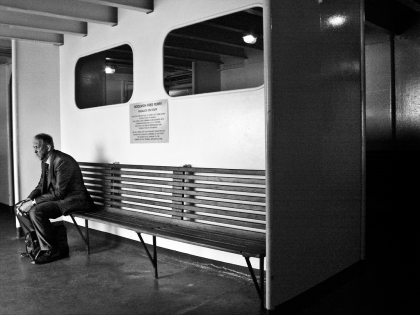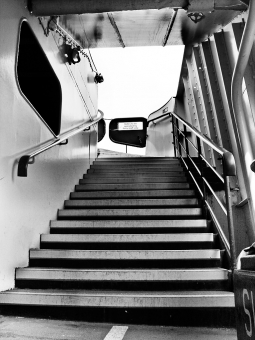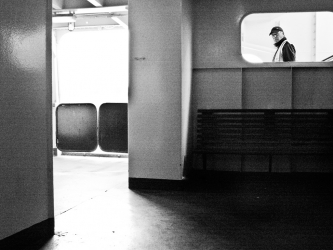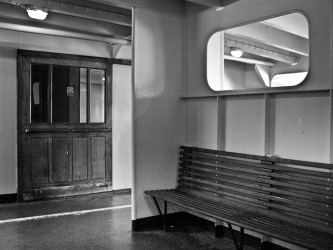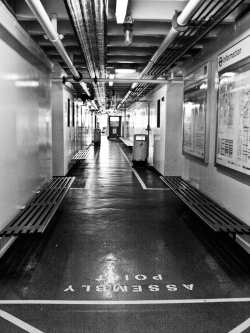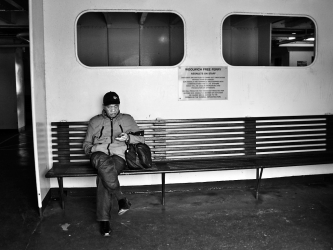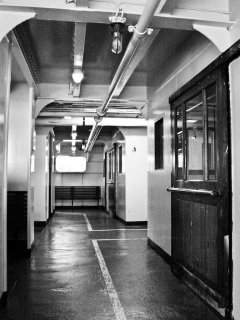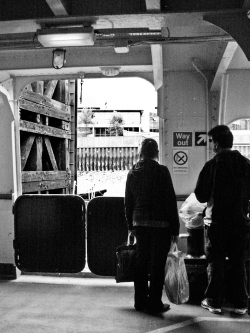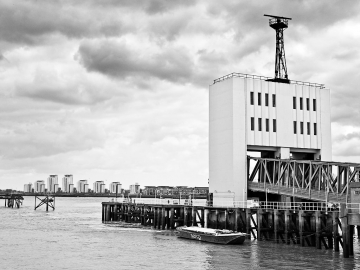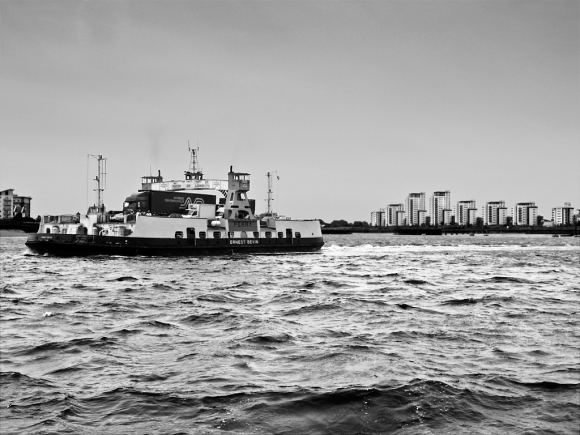The lorries are starting to move now, rumbling across the deck of the James Newman and onto the ramps that shake and ring beneath their tyres. He is supposed to leave too, supposed to climb the yellow metal steps from the passenger deck to the red metal gates that always remind him of Meccano. There is an announcement over the tannoy, every time a ferry docks, forbidding passengers to remain on board.
Sharon had phoned him the day after the riots, to make sure he was OK.
“We saw the pictures on the news, Grandad. That Wetherspoons, the one they set on fire – that’s the one you used to go to, isn’t it?”
And he’d said yes, because it was. The Harry had been one of those friendly but cavernous places where nobody minded an old man sitting in a corner making half a pint last a couple of hours. Cheap, too, obviously. That’s why most of them went there. And, as Sharon had continued to remind him what an awful place Woolwich was, with its (her words) scuzzy old market and filthy grey windows plastered with out-of-date posters and To Let signs and nothing on Powis Street these days but poundshops and bookies, he’d closed his eyes and wondered what the others would be doing now that the Harry had gone, all those nameless old men with their watery eyes and half-full glasses of Ruddles. Not so old, many of them. Not as old as him.
![]()
He’d brought Sharon and young Ashley out here on the ferry once, on one of those rare afternoons when a nagging conscience had prompted her to catch the 161 over from Chislehurst. He’d thought the kid would enjoy it – had to be more fun, surely, than fidgeting with a lump of stale Battenberg in the residents’ lounge while his mum and Great-Grandad nattered on? Computer games or what-have-you were all very well, but – deep down, boys were still the same as they’d always been, weren’t they? Just like boats were still boats.
![]()
The first time his own father had taken him on the Gordon had been magical. They’d still lived on Brookhill Road back then – he and his parents had the downstairs, and Mr and Mrs Forrest were up above. No inside toilet or bath, but a piano in the front parlour, even though nobody played. He used to go to Foxhill School, just off Plumstead Common Road, and every morning, before getting ready, he’d stand on the red stone doorstep and watch his father head off down the hill towards the river. His father worked on the other side, as a foreman on the railway at King George V. Then one day, one day in July when there was no school, his father had suddenly tossed him his cap and said, “Come on, Frankie boy, let’s go to sea!”
Down at the end of Hare Street, the chimneys of the Gordon had stuck up above the terminal like sticks of charcoal. Standing on the pontoon, waiting to board, Frank had watched them belch big sooty gobbets high into the summer air. His father had showed him round the ferry with almost proprietorial pride, prodding him forward into secret spots where steam hissed and whistled and thick glistening pistons could be seen gliding smoothly back and forth in their casings. The noise had been ferocious, and everywhere had stunk of oil and burning grease. As they’d walked around, his father had explained all about expansion valves and double-acting cylinders and centrifugal governors, shiny brass balls on rapidly spinning rods that rose and fell and kept the engine’s speed in check, then lifted him up to a wide glassless window to watch the Gordon’s stokers, skinny bodies smeared with sweat and soot, hurl black shovelfuls of coal into the bright white maw of the furnace. The best had been saved till last, though. Another small aperture, this time tucked into an L-shaped kink on the outer wall of the ship. Frank had gripped the metal sill, felt the hard round heads of the rivets dent the soft flesh of his fingers, and pulled himself up onto the tips of his toes. As he’d done so, an explosion of what felt like rain had hit him full on his face. Instinctively, he’d shut his eyes. When he’d opened them again, he’d found he was looking back along the length of the hull and, directly in front of him, yet almost invisible so thick was the spray around it, one of the ship’s two giant paddle wheels was beating the river into piles of snow-white foam.
When they’d docked at North Woolwich, Frank’s father had introduced him to one of the men who worked on the vehicle deck. This was Bill, he was told, and Bill would be looking after him on the trip back. Bill had doffed his cap, revealing an entirely bald head, and made great play of shaking Frank’s small hand. Over the next few months, under Bill’s supervision, Frank had got to know every corner of the Gordon; once, he was even allowed inside the engine room, and given a small piece of coal as a souvenir. It was really no different to the coal they used on the fire in the back parlour at Brookhill Road, but – Frank had put it safely on the shelf beside his bed.
![]()
When he was older, Frank and Alfie Brooks, his best pal from Foxhill, often used to spend whole afternoons on the river. All the kids would play on the boats in those days: helter-skelter games of “he” across the vehicle deck, Wild West gunfights on the boiler tops, daring each other with ladders and unlocked doors, everyone larking and cheeking the crew till threats were made of coppers, and then – when finally told to sling their hook – charging back through the foot tunnel, whooping and hollering, rushing to meet the same boat at the other side and begin all over again.
Frank and Alfie weren’t really interested in all that, though; they just liked the boats: the Gordon and the Squires, the Will Crooks and the John Benn – they knew each one intimately. The Royal Docks were at their peak back then and often, when the tide was high, Frank and Alfie, alerted to an unexpected change of course by the ringing of the ferry’s telegraph bells, would hurtle up on deck to see some mountainous slab of a freighter slide by, compass set for Suez, Kiel or Panama. Those old paddleboats could shift a thousand men across the river at a time; even so, three of the four would often be in steam together.
![]()
Frank sits now and stares at the empty iron-walled labyrinth of quietly humming gangways and white-painted cabins. These new diesel boats came in during the Sixties, and one of the crew once told him there was room for five hundred down here. Some cabins, like the one in which he now sits, are really just open-mouthed bays set back from the gangway, with wide round-cornered oblongs cut into the metal panelling to let the light pass through. Others have glazed upper halves and brass-handled wooden doors that slide across for warmth and privacy: with the words Smoking and Non-Smoking etched in the glass, these ones always remind him of the waiting rooms of country stations, the sort they used to sit in when coming back from the hop-picking. The doors are kept permanently locked these days, though – there is no call. The benches’ varnished wooden slats glow deep russet, but no more than a handful of people ever make the trip; sometimes, it’s just him; him and the cars and lorries up above.
![]()
Ashley hadn’t been impressed. Not even when Frank had shown him where, on either side of the ship, an opening roughly the size of the lift doors in the foot tunnel had been cut into the bulwarks to make an emergency exit, with only two waist-high metal flaps to stop you falling through.
“Look, Ashley,” Frank had said, rattling the bolts that held the flaps together, “see now near the water we are?”
Ashley had dutifully leant out and peered down.
“Oh, yeah,” he’d said.
When the boat had swung out into midstream, Frank had tried to draw the boy’s attention to the view back upriver, through the Barrier to Canary Wharf and the City, but Ashley had just said “uh-huh”. And when Frank had started telling him about the docks, and about the trains that his father had once marshalled at King George V – gaudy lines of trucks loaded with goods from around the world and stencilled with the names of merchants in distant English cities – Sharon had butted in and, pointing at one of the interior spaces, said:
“Come on, Grandad, it’s too cold and wet for you to be out here. Let’s have a nice sit down in the warm and then get you back to the Chestnuts.”
And that had been an end of that.
![]()
A new lot of passengers are coming down the yellow steps now. A blonde girl and her boyfriend, a woman wearing a bright red coat and lugging two large plastic bags from the Argos on Powis Street, a man with a shivering dog and an open can of lager, and a dark-haired young couple with a small boy. Both father and son are wearing matching blue football tops with the word “Samsung” printed in white letters across the chest. They all troop past, following the white line on the floor that leads to the steps at the front of the boat – ready, already, to depart.
These days, the crew let him stay on board during turnarounds.
“I don’t want to get off,” he’d told them one day at North Woolwich. “I was sixty years old when the docks closed, and I’ve not been back since. There’s nothing for me now on this side. You want to make an old man climb up those steps, just to climb back down again?”
And they’d told him about Health & Safety, and about how it was more than their jobs were worth. But then one day, not long after, when the rain was sheeting over Thamesmead and the Barrier nothing but a lumpy shadow through the mist, they’d relented, and told him to just sit quietly. And that’s how it had been ever since – they all knew him now, and no one asked questions. He’d usually make five or six round trips before disembarking, then wander over for a half at the Harry before heading back to the Chestnuts for tea.
Except he couldn’t go to the Harry any more, because the Harry had been burnt down. How could they do that? Stupid little idiots. And where was he supposed to go now? He’d tried some of the other pubs, but they were full of loud music and men with faces like fists who didn’t seem to want an old man sitting quietly in the corner. Once, filled with a sudden spirit of adventure, he’d gone in McDonald’s; sitting in a bolted plastic chair sipping insipid tea from a polystyrene cup and chewing something sweet and prickly that the girl behind the counter had assured him was an apple pie, he’d looked out at the rain falling over Powis Street and thought: “Is this what people do?”
Him and Alfie used to buy apple pies from a stall in Beresford Market, and heat them up on the black metal casings of the Gordon’s boilers till the pastry crumbled in their hands. It was good to sit up above the boilers in winter, and no one seemed to mind. You had to watch what you touched, though. That metal got pretty hot.
Apple pies, Eccles cakes – sometimes a bag of chips.
“Frankie!”
Someone has just said his name. But no one’s called him Frankie for years. He’s been Frank ever since he left school. Except, he reflects, momentarily distracted, no one even calls me Frank any more. I’m Mr Wheeler, if I’m anything at all.
But someone has just said his name. He’s absolutely sure of it. He wanders over to the gangway at the side of the boat, and sits on the end of a long wooden bench facing out towards the river. In front of him is the emergency exit and, beside the metal flaps, the dark-haired couple with the small boy are talking. The woman seems to be pointing at something outside on the water. There is no one else around: the others have already made their way up the yellow steps to lean against the red Meccano gates and wait.
Confused, he stares out at the sky. Any trace of blue has long gone; it’s like someone has pulled down a dirty white roller blind. Thamesmead’s high-rise blocks stand like bleached tombstones on the southern shore. Across the water, on the Essex side, he thinks he can just make out the new flats at Gallions Point, but – these days, his eyes aren’t so good, and memory paints in the gaps. Beyond the flats would be the old Gallions Hotel. Hard to imagine, now, but well-to-do people used to travel out to Gallions on the boat-train and spend the night there before, next morning, boarding the P&O liner that would carry them from Royal Albert’s quays to the empire’s furthest corners.
Odd words of conversation drift across to him, and Frank realises that the dark-haired couple are Polish. The woman stoops to adjust the strap of her shoe, and catches Frank’s eye. She smiles.
“Dzien dobry,” Frank says. The woman looks surprised, then says something back to him. Frank shakes his head.
“Sorry, miss, that’s all I know. Dzien dobry.”
“Well, this is more than most English people know. Good afternoon to you too.” Her voice is soft, slightly husky, and makes him think of red wine and unfiltered cigarettes. Not that he’s smoked for years, not since Sharon’s mum was born.
“It’s the War,” Frank explains, standing up and walking across. “I flew with a lot of Poles during the War. Picked up a few words along the way, but… well, it was a long time ago.”
“War?” She frowns, and says something in Polish to her husband, who shrugs.
“A lot of people from your country… they fought with us against Hitler. Very brave people.” He pats his chest, just above his heart, wanting to make sure she understands. “Good men. Good brave men.”
“Ah… yes. I think I know of this.”
“There’s a big memorial out west. Place called Northolt. RAF Northolt was where the Poles were based. All the names are there – on the stone. It’s very moving. Do you know it?”
She shakes her head.
“Sorry. War was a long time ago. But I am very glad, you made friends with Polish people. We have very many good friends here now too.”
“You live in London?”
“In Beckton, yes. Nice house. Usually, we take DLR, but he likes to come on boat.” She places her hand on her son’s shoulder. “Don’t you, Frankie?”
The boy looks up.
“Yeah. It’s really cool.” He turns and points out through the opening on the opposite side of the deck, the upstream side. “That’s the Thames Barrier. It has these huge gates under the water and, when there’s a really high tide, they come up and block the river. They built it to stop London flooding because, in the old days, London was always flooding, and loads of people used to die. Mum says that next time they close it, we can go and look.”
“Is that so?” Frank says. “I bet that’s something to see.”
“She could take you too, if you want.”
Frank laughs. “Well, I’m not so sure about that.” He glances across the water to where the metal ramps of the north terminal hang in the air, waiting for them to dock. “I’m called Frankie too, you know.”
“Cool,” says the boy.
His mother ruffles his hair.
“I wanted to call him Jacek, like my father. But Piotr insists. ‘We’re in England now,’ he says.”
Her husband speaks for the first time.
“Frank Lampard.” He grins, and points to his shirt. “Chelsea.”
The James Newman has docked at North Woolwich. Above their heads, lorries are firing up their engines and chains are being thrown aside. The boy leads his parents up the yellow steps, and Frank begins to make his way back to the long wooden bench, ready to sit out the turnaround. The woman hesitates.
“You are not coming?”
Frank shakes his head.
“No, no, I just go back and forth. Nothing on this side for me.” He pauses. “I’m sure I’ll bump into you all again, though, if young Frankie likes the ferry so much.”
“Mum! Come on! I can see the bus!”
“Perhaps.” She smiles. “And if you ever change mind, about nothing on this side, always welcome for a cup of tea.”
“That’s very kind, miss. Maybe I’ll take you up on it one day.”
“474. Very easy.” She glances up the stairs. “I must go now. Was very nice to meet you, Frankie.”
![]()
He waits. Soon, new people come down the yellow steps. They clatter past him, following the white line on the floor to the far end, but Frank doesn’t move. He listens as the tannoy broadcasts its usual safety message, then makes his way up the now-empty stairs to the red Meccano gates.
The James Newman is spinning slowly away from the shore. Across the river, the Ernest Bevin mirrors its movements; soon, there is clear water between its stern and the Woolwich loading ramps. Frank lifts his gaze. Beyond the terminal, rows of grey houses rise up towards the barracks and the Common. And beyond that, he knows, would be the trees on Shooters Hill.
The two boats continue their endless, circling dance.

